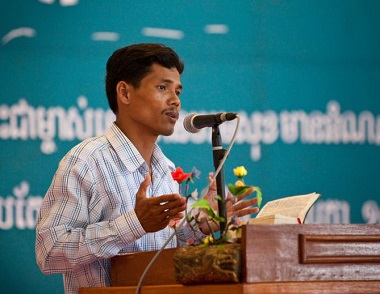
Church leader in Phnom Penh, Cambodia. Cross-cultural ministry practitioners today emphasize the importance of empowering national churches
This weekly editorial gives opportunity for people to speak about issues they believe are vital for the church to respond to.
One of the goals of this weekly article is to spark dialogue – and action. We invite you to join the dialogue either here on Church for Vancouver or on the CityGate Vancouver website.
We also invite you to use the article as a discussion starter with your church small group, your church staff, your friends or your neighbours. Feel free to re-post the article on your own social media. Thanks for participating in the conversation!
Think of any novel or film script that sets up its central conflict around an attempt to rule the world: invariably the character in pursuit of power is cast as antagonist and villain. As much as any society has its heroes, we all agree that no one should have all the power.
Perhaps this is why, amid the wreckage of the colonial project, the idea of ‘global mission’ is widely viewed as anathema. The very words seem to imply perpetuation of the actions and attitudes which, in the quest for dominion, have caused such harm.
So, I reflect on the title of this article somewhat uneasily, even though I live in the world of cross-cultural mission and write to affirm its value and necessity. Perhaps we need to ‘disarm’ the topic of its loaded meaning and reframe the question: “Why Jesus’ mission in a post-colonial world?”
What is meant by global mission is open to interpretation, but if we are to consider the mission of Christ – surely the rightful subject of this discussion – the only valid place to start is with Jesus himself: how did he understand his own mission, and what did he teach his followers to do?
Colonialism itself has a clear definition. Miriam-Webster describes it as “domination of a people or area by a foreign state or nation . . .”, then adds this:
NOTE: While the word colonialism is sometimes considered to encompass non-state forms of influence and domination, as by corporate or religious entities, in general use it is more typically understood as an extension of state power.
The distinction between religious influence and state power is important. To understand how the two get mixed up (as, sadly, they often do) and how they can begin to be untangled, it’s necessary to distinguish between what belongs to Caesar and what belongs to God.
Mission under colonialism

in 1493 Pope Alexander VI issued a papal decree dividing rights to Western Hemisphere lands between Spain and Portugal on the condition that they spread Christianity.
The 21st century continues to feel the effects of three waves of European colonial expansion that stretched from 1415 to 1885.
Although their character and intensity varied across different times and nation states, the European campaigns were marked by features typical of imperial regimes through history: political conquest and oppression of native communities, economic exploitation and forced cultural assimilation of indigenous peoples.
All this was undergirded – and justified – by attitudes and doctrines of racial and cultural superiority.
If we compare the colonizing enterprise with the life and teaching of Jesus of Nazareth, it’s hard to imagine a starker contrast.
Catholic and Protestant missions in the colonial period too often failed to make this essential distinction. After Spanish and Portuguese conquests and subjugation of Indigenous peoples, Pope Alexander VI in 1493 issued a papal decree dividing rights to Western Hemisphere lands between Spain and Portugal on the condition that they spread Christianity.1
The Dutch and British East India Companies originally limited mission activity to protect their commercial interests. In time, however, they came to view missionaries and their knowledge of local people and their culture as allies. The missionaries similarly saw themselves as not only as messengers of the gospel but as ambassadors of a superior culture: “colonial officials and missionaries alike consciously took it upon themselves to be the guardians of the less-developed races.”2
Such attitudes are neither distant nor ancient. In Canada, we need look no farther than the tragic abuse of indigenous children at church-run residential schools. Our national conscience was seared with the discovery of hundreds of unmarked graves on school sites this year.
A significant issue in assessing the impact of mission activity in the colonial period is that examples like these are generally familiar, but public perceptions of the events are often shaped by popular media and subjective perceptions.
“What’s missing,” says Baylor University research professor Robert Woodberry, “is a comprehensive and balanced examination of the actual historical and statistical evidence.” Woodberry has conducted such research himself and has published his findings in non-Christian academic journals.
His conclusion?:
Although missionaries and other religious ‘radicals’ have been widely resented in their day, they have also been central to the abolition of slavery, the development of mass education and the flourishing of organizations outside state control.
Indeed, the effects of 19th and early-20th century missionaries are still measurable in the levels of educational enrollment, infant mortality and political democracy in societies around the world.3
I could go on to cite positive examples of missionaries standing against their colonial governments on behalf the peoples they served. But my purpose is not to make a case for mission under colonial rule.
Rather, these brief historical examples are given to affirm that the evils of colonialism were real, and that Christian mission was tainted when it aligned itself with the imperial agenda. What, then, for the post-colonial world? Why global mission today? For this we need to go back to its beginnings.
Mission the Jesus way

Ecce Homo (Behold the Man) by Antonio Ciseri. Pontius Pilate presenting Jesus to the crowd before his crucifixion.
Jesus was born to a poor family in a community under colonial rule. His parents fled by night to prevent his being murdered as an infant by Herod, the Roman client king of Judea. He was tried by a Roman governor and executed under Roman law.
The defining event for his ancestors was their exodus from another empire, Egypt, when Moses led them out of slavery to become the people of God.
Later, when their own kings became oppressors, Israel’s prophets declared judgment on its leaders and called the people to justice and mercy.
Jesus saw himself in the direct line of the prophets when, at the beginning of his ministry, he quoted Isaiah to announce his own mission:
The Spirit of the Lord is on me, because he has anointed me to proclaim good news to the poor. He has sent me to proclaim freedom for the prisoners and recovery of sight for the blind, to set the oppressed free, to proclaim the year of the Lord’s favor. Luke 4:18-19
Jesus’ message and history stands in absolute contrast to the colonial enterprise. “The thief comes only to steal and kill and destroy;” he said, “I have come that they may have life, and have it to the full.”4
Jesus’ mission is to bring good news, freedom, healing, delivery and blessing – together with eternal life. This is balm for a world in desperate need of peace, hope and liberation. Today, that includes some three billion who have never heard the gospel.
Dr. Joshua Bogunjoko, International Director of SIM International, was a keynote speaker at Missions Fest earlier this year and took part in a missions conference in New Westminster last week. He wrote: “I am from a town renowned for occult practices, idolatry and the dominion of darkness, and from a family whose members rejected the gospel at the first encounter. Today, my family are believers, and I am a missionary. Why? Because many years ago, a Canadian named Guy Playfair loved the Lord so much that he went looking for communities where Christ was least known. He found my community.”
But isn’t it imperialistic to impose our beliefs on people of other cultures and faiths? To impose, yes. Yet that’s not the Jesus way.
Instead, he calls his people to announce the good news,5 to testify to his resurrection and its power in our lives6 and to invite others to receive the free gift of life in Christ.
For those uneasy with the idea of Christians sharing their faith with people of other cultures and convictions, a question: Do we believe that God is good – the highest good? Do we believe that Jesus is the Son of God?
These are essentials of the Christian confession. If God is indeed good, if all his fulness is found in Christ, can it be anything but good for people everywhere to know him?
An answer from the ‘other side’ of Christian mission: 14 months ago, we mourned the passing of Verna, a single woman who had served a Southeast Asian people group for more than 50 years.
When news of her death became known, believers belonging to this group gathered from around the world to express their gratitude for her. Why? Because she had brought the message of Christ’s love and salvation to their people.
Christ’s mission faithfully embraced disrupts colonialism. Yet is still possible to ‘serve’ others while seeing ourselves as better than them and wanting to exert control.
This is ethnocentrism, the persistent and often hidden assumption that our culture and tribe is superior. I’ve seen it in Western missionaries, and I’ve seen it in people of other cultures. I’ve seen it in myself.
When we think we know best, Jesus says, “You are not to be called ‘Rabbi,’ for you have one Teacher, and you are all brothers.” When we seek control, he says, “Not so with you.” To all, he says, “Whoever wants to become great among you must be your servant . . . just as the Son of Man did not come to be served, but to serve and to give his life as a ransom for many.”7
This is mission the Jesus way. The One who set aside his divine power to serve and lay down his life says, “Learn from me, for I am gentle and humble of heart.”8 He also says, “Go and make disciples of all nations: invite everyone – yes, including the post-colonial world – to learn from me, too.”9

Stephen McElroy
1 Muldoon, James. “Papal Responsibility for the Infidel: Another Look at Alexander VI’s” Inter Caetera”.” The Catholic Historical Review 64.2 (1978): 168-184, quoted in Wikipedia, “Spanish colonization of the Americas.”
2 Walls, Andrew F. 1982a. British Missions, in Christensen & Hutchison: 162-164, quoted in Bosch, David. Transforming Mission: Paradigm Shifts in Theology of Mission. Maryknoll, New York: Orbis. 2011
3 Woodberry, Reclaiming the M-word: “The Legacy of Missions in Nonwestern Societies” in The Review of Faith & International Affairs (January 1, 2006).
4 John 10:10
5 As in Luke 24:47 and Mark 16:16
6 As in Luke 24:48 and Acts 1:8
7 Matthew 23:8, 11; 20:26, 28
8 Matthew 11:29
9 Matthew 28:19
Stephen McElroy is Community Engagement Team Lead for OMF Canada. Prior to serving in this role, he worked for 21 years in Southeast Asia with OMF in Christian publishing, field leadership and leading an urban poor ministry team. He lives in Metro Vancouver.

Why global mission in a post-colonial world? Because colonialism is one of global mission’s greatest impediments.
We do not need to look beyond Canada to understand this. The arrogant ethnocentrism that even allowed the idea of residential schools to spring forth was sickening. What was worse was that the four denominations involved in the schools allowed themselves to become involved in their administration.
Instead of viewing each First Nations child as a spiritual being created in the image and likeness of their creator, they viewed them as a culture they deemed inferior, and therefore cruelly determined that only by separating the children from their families and villages and “beating the Indian out of the Indian” could they be successful in their mission to convert them.
The key for us, I would say, to be successful in global mission is first and foremost to view each person as a created being, made in the image and likeness of God – and therefore of immeasurable worth – who is, as Jesus taught in the Parable of the Good Samaritan, our neighbour, and therefore in need of our love.
Missions must be an act of love, loving God by our obedience to His commission to us, and loving each and every person as our neighbour, who needs to hear the Good News of the gospel every much as we have heard it. Someone loved us enough to share it with us. Let us pass along that love.
I am thankful for the editorial.
While global mission is an issue vital for the church to respond to, I have to caution qualifying our world as “post-colonial,” particularly when the article acknowledges the waves of colonial expansion stretched from 1415 to 1885.
Such lengthy period should help us identify the said “domination of a people or area by a foreign state or nation” is not just one mega event over a few days but a deliberate process of usurping another sovereignty, passing colonial laws to undermine the culture, language and at times the survival of another people group, dispossessing them of land and resources, and committing cultural genocide if not worse.
As five and more centuries of colonialism has engraved into the western psyche a distorted sense of entitlement and superiority, it will likely take just as long to undo it.
Note that before the Nisga’a Treaty was signed in BC, we had a century long gap when no treaty was signed with any Indigenous nation. Generations of British Columbians grew up with no clue that treaty signing is needed and overdue.
So it is premature to use “post-colonial” when the majority of land in this former colony are still unceded Indigenous territories. Looking at other former colonies around the world, many – though freed – still bear the unattended wounds or scars of colonialism.
Amidst Martin Luther’s famous 95 Theses in 1517, none of them dealt with rejecting Pope Alexander VI’s 1493 papal decree which gave moral and spiritual legitimacy for all to take native lands not occupied by Christians and Whites. In the ensuing Protestant Movement, the Christian church has remained a beneficiary of colonial expansion but has yet to express repentance, much less return anything gained from the expansion.
Despite rhetoric by politicians and vested interests, our duties have not been discharged by a government apology, a government funded TRC and now verbal acknowledgements of Indigenous land ownership at beginning of meetings. For many Indigenous people, such acknowledgements are mere cruel reminders of colonialism that still undermines their rights and lives every day.
So for those who seek first God’s kingdom and His righteousness, reconciliation with Indigenous nations cannot be some government event or proclamation, but by nature be a humble process of decolonization involving everyone and every institution, with the goal of reversing every harm, prejudice and entitlement embedded by colonization into Canada’s soul.